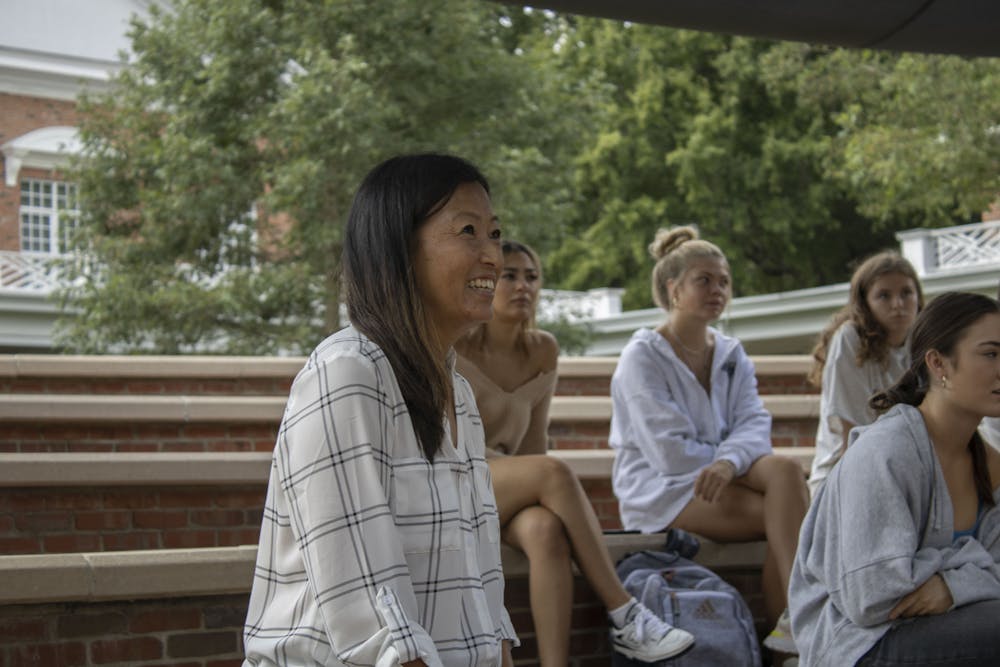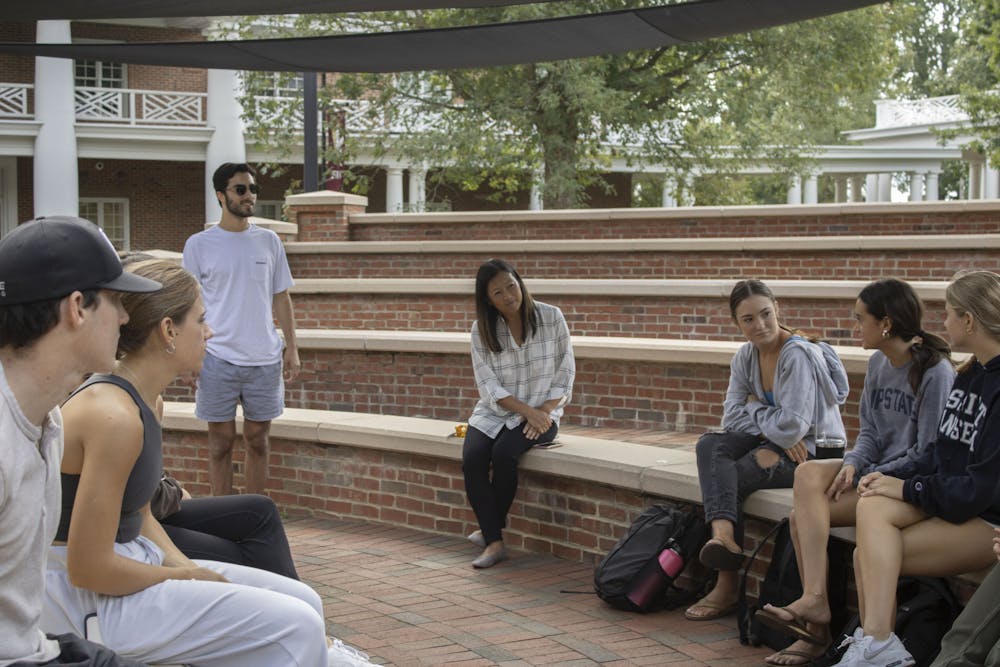At the start of every semester, Elon University professor of performing arts Kim Shively invites each of her classes to create a community agreement, setting the expectation for how the group works together.
“Those community agreements are actionable that the ensemble agrees to in order to have a positive working experience,” Shively said.
The university was ranked No. 1 in excellence in undergraduate teaching by the 2022-23 U.S. News and World Report rankings for the second straight year. But to achieve excellence, professors across all of Elon’s departments and disciplines must effectively navigate their relationships with students, both personally and professionally.
“I think that because one of the things that attracts me to Elon specifically, is that Elon is a teaching institution, meaning that faculty are encouraged and measured really by the effectiveness of their teaching and mentoring,” Shively said.
According to Shively, professor-student collaboration within the performing arts department is creative in nature, which can be both empowering and vulnerable. Therefore, it is the responsibility of the professor to establish clear boundaries with students to foster the creative process.
“In order to earn promotion, tenure, we have to prove that we are strong teachers,” Shively said. “Not everyone is going to have a strong mentoring relationship with their students that is as engaged as we are privileged to have [in] performing arts because we are making something together often, we’re engaging in a creative process.”
One of Shively’s students, senior Jack Morrill, agreed that compared to other disciplines, performing arts requires more emotion.
“My math, my science courses, it’s much less vulnerable in those classes,” Morrill said. “There’s a certain level of vulnerability that is required from both the teacher and the students in a performing arts class because you’re telling stories, you’re learning how to tell the stories of others, and that takes a certain amount of empathy.”
Professional mentorship
Professor-student engagement extends beyond the Department of Performing Arts, but in more traditional fields of study, such as finance and nursing, strong connections are often formed through mentorship.
As faculty mentor to the business fellows, Raj Gupta, professor of finance, feels a particular connection to them because they often spend a lot of time together working on competitions. He said many of his students simply call him Raj, and gives his phone number to those students he works with on competitions.
“I think I think that’s what Elon does best, honestly,” Gupta said. “I think that’s what faculty at Elon do great at.”
Senior business fellow Ava Rosen said she is comfortable talking to her professors about all sorts of things, professional and personal.
“I feel like I have a very comfortable relationship with my professors. I would say it’s a good mix between professionalism but also they know how I work personally. They know a little personal information about me,” Rosen said. “I think our communication style is very open. It’s very transparent. I feel comfortable going to my professors for any questions, projects, internship advice, professional advice.”
Rosen said she is closer to certain professors, specifically female ones, and has gone for coffee with her adviser, professor of finance Kate Upton. She said these close relationships are due to Elon’s community-oriented style of teaching.
“I think it all just kind of correlates to Elon’s close knit community and wanting to have that close relationship with your professors, keeping classroom size smaller so that professors understand their students on more than just an academic level,” Rosen said.
This is true in Elon’s new nursing school as well. Michaela Fraini, a student in the School of Health Sciences accelerated Bachelor of Science in nursing program, completed her undergraduate degree at Dean College. Working with her adviser, Stacey Thomas, professor of nursing, she said she can see a difference in how fast relationships grow.
“I think there’s a difference between my undergrad and Elon in the sense that the relationship is established a lot sooner,” Fraini said. “And that’s because this is a 16 month program, as opposed to like four years, but the way that they have presented themselves and the professors and the faculty … they all seem to be in our corner rooting us on and that is very apparent.”
Thomas has an open door policy for her students to talk about anything they need to and gives out her phone number on the first day of class for emergencies or urgent questions.
“They can come and talk to me about problems they’re having with classes. They can talk to me about personal issues,” Thomas said. “They know that they can come and talk to me if they have any kind of problems.”
Personal Boundaries
But all professors agreed that effective relationships with students require some boundaries. Thomas said the biggest boundary she sets with students is that they cannot call her by her first name — a principle Shively agreed with.
“I found that using the name Professor Shively really helped me have that boundary and reminded me that I’m there to mentor. I’m there to help develop my students, and I care deeply about my students professional and personal lives, but having that boundary was really important,” Shively said.

Professor of biology Yuko Miyamoto said that students are welcome to talk to her about anything, but she would not discuss her personal life with them.
“If they just need to talk about class things I’ll definitely make myself available. … Usually, if I have home things, then I believe those would be conflicts,” Miyamoto said.
According to Miyamoto, one of the most rewarding things about developing a relationship with students is helping them after they graduate. This includes applying to medical school but extends beyond their academic careers.
“Students, I don’t know if they’ve always appreciated that faculty are willing to help even after they’ve moved on,” Miyamoto said. “And I’ve had students within our department who were looking for jobs to find out like do you know anyone who does X? Generally, we’re pretty supportive of that.”


